|
|
|
Sort Order |
|
|
|
Items / Page
|
|
|
|
|
|
|
| Srl | Item |
| 1 |
ID:
168795


|
|
|
|
|
| Summary/Abstract |
Understanding how foreign policy decisions are made in revolutionary states has proven to be a difficult puzzle for scholars and practitioners alike. While political scientists have made great strides in developing standard decision-making frameworks, those have generally been based on the experiences and conditions of Western states and rely on stable government structures for their explanatory power. Revolutionary states by their very nature lack this stability, since the conditions of revolution commonly result in major reorganizations or wholesale removal of preexisting government structures. In this article, we begin to build a new framework for understanding decision-making in revolutionary states and employ case studies of Iran, Russia, Sudan, and Afghanistan to show that the process in these states involves input and considerations from various actors and therefore cannot be understood by simply looking at the desires of the charismatic leaders that are so often the focus of outside analysts.
|
|
|
|
|
|
|
|
|
|
|
|
|
|
|
|
| 2 |
ID:
168798
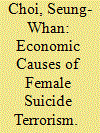

|
|
|
|
|
| Summary/Abstract |
Common belief holds that economic misery motivates more people to commit acts of suicide terrorism. The existing literature, however, fails to find an empirical linkage between these two phenomena. This study offers a novel theoretical perspective and statistical evidence on the economy and terrorism connection. I argue that Muslim women decide to engage in acts of suicide terrorism because of their perception of the national economy, rather than actual economic conditions such as gross domestic product per capita or the Gini index. Based upon a statistical analysis of 4,495 incidents of suicide terrorism during the period from 1981 to 2015, the study shows that, when Muslim women perceive their national economy to be unfavorable, they are more likely to commit acts of suicide terrorism.
|
|
|
|
|
|
|
|
|
|
|
|
|
|
|
|
| 3 |
ID:
168801
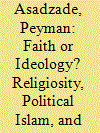

|
|
|
|
|
| Summary/Abstract |
The Middle East, particularly the Islamic Republic of Iran, has a reputation for harboring very strong forms of anti-Americanism. Why are some individuals more hostile to the United States than others? What factors are associated with anti-American sentiments? This article offers the first systematic study of anti-Americanism in Iran, a country in which anti-Americanism has been a guiding policy of the government since the 1979 revolution. Based on original survey data from 2016, I seek to explain how religiosity and political Islam influence public attitudes toward the United States. Distinguishing between political and cultural anti-Americanism, I find that, while support for political Islam is significantly associated with both types of anti-Americanism, religiosity predicts only cultural anti-Americanism. The findings challenge the literature that associates anti-American sentiments with religiosity in the Islamic world.
|
|
|
|
|
|
|
|
|
|
|
|
|
|
|
|
| 4 |
ID:
168802
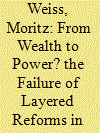

|
|
|
|
|
| Summary/Abstract |
This article puts forward a historical institutionalist explanation of how rising powers translate increased wealth into military strength. It develops microfoundations for path dependence and applies them empirically as an approach to defense procurement. The Indian government layered market reforms onto a state-run defense sector. It aimed to exploit competition in its massive acquisition of combat fighter aircraft after 2007. Yet, despite formal rule changes and overwhelming material benefits, government reformers ultimately failed and returned to an intergovernmental purchase in 2015. I develop two mechanisms to explain this instance of failed institutional change in India. First, the reform's structural misfit created uncertainty, as some of the prerequisites for a market such as sound legal protection and private actors were absent. Second, the government reformers were reluctantly supported at the outset by a coalition of so-called opportunists, which neither fully embraced nor strongly opposed institutional reforms. When problems resulting from the misfit multiplied and promised benefits vanished, however, this coalition dissolved and layering failed. A process-tracing analysis and the triangulation of a diverse set of data substantiate this explanation. The article contributes to debates on institutional change as well as to those on rising powers and the constraints they face in their attempts to transform growing wealth into military strength. Most significantly, it specifies a causal pathway along which state institutions shape the defense policies of rising powers. Layered reforms may fail not only when faced by defenders of the status quo; opportunists may suffice to defeat them.
|
|
|
|
|
|
|
|
|
|
|
|
|
|
|
|
| 5 |
ID:
168793


|
|
|
|
|
| Summary/Abstract |
Climate change poses a grave security threat to national borders, habitats, and vulnerable people. Plagued by asymmetries in both states' vulnerability to climate impacts and their capacity to mitigate them, climate change presents states with a “wicked” problem that poses significant obstacles to interest-based solutions. Yet, most global climate change policy involves rationales and mechanisms grounded in an interest-based logic of consequences: information-sharing, reciprocity, and exchange. We argue that strategies that promote ethics-based discourse and policies offer considerable promise for hastening stronger global climate governance. We argue that successes in human security norm-building, including bans on land mines, cluster munitions, and nuclear weapons, provide climate scholars and practitioners with alternative governance models that rely on activating a logic of appropriateness and spearhead faster, more effective climate action. We identify five strategies that previous scholars have shown fostered efforts to promote a logic of appropriateness in human rights, humanitarian law, and disarmament. We examine the empirical experience of those strategies and particularly highlight the recent success of efforts to negotiate a treaty banning nuclear weapons. Given the success of these strategies in other issue areas, we argue scholars of climate change could fruitfully focus greater attention on political efforts that promote strong global ethical norms for climate action.
|
|
|
|
|
|
|
|
|
|
|
|
|
|
|
|
| 6 |
ID:
168804


|
|
|
|
|
| Summary/Abstract |
International relations (IR) has seen a proliferation of recent research on both international hierarchies as such and on historical IR in (often hierarchical) East Asia. This article takes stock of insights from East Asian hierarchies for the study of international hierarchy as such. I argue for and defend an explanatory approach emphasizing repertoires or toolkits of hierarchical super- and subordination. Historical hierarchies surrounding China took multiple dynastic forms. I emphasize two dimensions of variation. First, hierarchy-building occurs in dialogue between cores and peripheries. Variation in these relationships proliferated multiple arrangements for hierarchical influence and rule. Second, Sinocentric hierarchies varied widely over time, in ways that suggest learning. Successive Chinese dynasties both emulated the successes and avoided the pitfalls of the past, adapting their ideologies and strategies for rule to varying circumstances by recombining past political repertoires to build new ones. Taken together, these phenomena suggest new lines of inquiry for research on hierarchies in IR.
|
|
|
|
|
|
|
|
|
|
|
|
|
|
|
|
| 7 |
ID:
168794
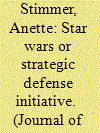

|
|
|
|
|
| Summary/Abstract |
Popular culture can influence debates over security policy. This article studies the use of Star Wars in the debate over Reagan's Strategic Defense Initiative (SDI). The term Star Wars was widely used to refer to SDI during debates in the 1980s. Scholars have pointed to both disabling and enabling effects of popular culture on political debates. This article refines these effects and introduces a third effect that comes from the widespread use of popular culture: a neutralizing effect that turns popular culture references into descriptive shorthands. Studying these dynamics contributes to our understanding of why popular culture is or is not used as a framing device and how it is used and perceived by decision-makers. I rely on content analysis of newspaper articles, congressional records, and political speeches and incorporate findings from elite interviews and the norm literature to conduct my analysis. I find that critics capitalized on linkages between the movie franchise and the policy to frame Reagan's missile defense system as Star Wars and to criticize his policy proposal. This science-fictionalization soon constituted the sociopolitical context surrounding Reagan's missile defense initiative. Most decision-makers perceived the Star Wars label to have a disabling effect as it cast doubt on the viability and desirability of SDI. Opponents initially tried to mobilize this effect, whereas most proponents argued against the label or refrained from using it. Few tapped into the enabling potential of Star Wars to communicate the potential benefits of SDI. The introduction of the professional term SDI helped proponents mitigate science-fictionalization in expert settings, while among the public the widespread use of the Star Wars label neutralized its meaning and turned it into a descriptive shorthand.
|
|
|
|
|
|
|
|
|
|
|
|
|
|
|
|
| 8 |
ID:
168796


|
|
|
|
|
| Summary/Abstract |
How does forced migration affect the politics of host states and, in particular, how does it impact states’ foreign policy decision-making? The relevant literature on refugee politics has yet to fully explore how forced migration affects host states’ behavior. One possibility is that they will employ their position in order to extract revenue from other state or nonstate actors for maintaining refugee groups within their borders. This article explores the workings of these refugee rentier states, namely states seeking to leverage their position as host states of displaced communities for material gain. It focuses on the Syrian refugee crisis, examining the foreign policy responses of three major host states—Jordan, Lebanon, and Turkey. While all three engaged in post-2011 refugee rent-seeking behavior, Jordan and Lebanon deployed a back-scratching strategy based on bargains, while Turkey deployed a blackmailing strategy based on threats. Drawing upon primary sources in English and Arabic, the article inductively examines the choice of strategy and argues that it depended on the size of the host state's refugee community and domestic elites’ perception of their geostrategic importance vis-à-vis the target. The article concludes with a discussion of these findings’ significance for understanding the international dimension of the Syrian refugee crisis and argues that they also pave the way for future research on the effects of forced displacement on host states’ political development.
|
|
|
|
|
|
|
|
|
|
|
|
|
|
|
|
| 9 |
ID:
168803
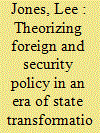

|
|
|
|
|
| Summary/Abstract |
There is growing evidence of the transformation of statehood under globalization, specifically, the fragmentation, decentralization and internationalization of state apparatuses. While most pronounced in Western Europe, these trends are observable worldwide. Foreign policy analysis (FPA) and international relations (IR) theory have fundamentally failed to keep pace with this epochal development. These traditions still largely understand states as coherent actors whose territorial borders “contain” sociopolitical relations and where identifiable “decisions” produce unified policies and strategies. This article challenges this shortcoming, offering a new theorization of foreign and security policy-making and implementation that foregrounds state transformation and the rise of regulatory statehood. The theory is developed and illustrated using the case of China, which IR/FPA scholars typically depict as the quintessential authoritarian, “Westphalian,” unitary state, but which has in fact undergone enormous state transformation since 1978. The article argues that the concept of a “Chinese-style regulatory state” can help understand and explain how Chinese foreign and security policy is actually developed and leads to outcomes that less coherent and strategic than IR scholars usually suggest.
|
|
|
|
|
|
|
|
|
|
|
|
|
|
|
|
| 10 |
ID:
168799


|
|
|
|
|
| Summary/Abstract |
More than three decades after the concept of international regimes was introduced, the study of why and how states may choose to cooperate, particularly around security, remains contested. While the field has evolved considerably over that time, there remain significant puzzles in the literature concerning the emergence of different types of security regimes. We aim to address these issues by developing the concept of a tacit security regime (TSR) literature. We define a TSR as an interest-based, limited, and informal mechanism of cooperation between states for the purpose of deconflicting their respective interests over a specific security issue. We illustrate the usefulness of our concept in the two contemporary cases of Russian-Israeli and Russian-Turkish security cooperation over the Syrian crisis (2015–2018).
|
|
|
|
|
|
|
|
|
|
|
|
|
|
|
|
| 11 |
ID:
168800


|
|
|
|
|
| Summary/Abstract |
Recent research has shown that disarmament, demobilization, and reintegration (DDR) programs often fail to uproot wartime command structures. A key question is why some ex-commanders succeed in retaining control over their ex-fighters, while others are less successful. This study seeks to address this question by comparing four former midlevel commanders (ex-MiLCs) in Liberia and the ex-combatant networks that they head. Contrary to previous assumptions, which have stressed the tendency of ex-fighters to flock around ex-commanders operating in spaces of marginality, I argue that ex-MiLCs employed as government brokers and who funnel patronage from ruling elites to ex-combatants are likely to possess the most durable networks. These findings highlight how ex-military bonds thrive where previous research expects them to be weakest: close to government elites who are often designated as “agents of change” by international peacemakers.
|
|
|
|
|
|
|
|
|
|
|
|
|
|
|
|
| 12 |
ID:
168797
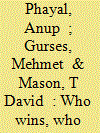

|
|
|
|
|
| Summary/Abstract |
Previous research has shown that the outcome of a civil war is related to conflict duration: military victory by either the government or the rebels occurs early if it occurs at all, and the longer a civil war lasts, the more likely it is to end in a negotiated settlement. The models of civil war duration and outcome that have produced these findings are built on characteristics of the civil war and less on attributes of the state itself, other than where the state lies on the Polity autocracy-democracy scale. We propose that how civil wars end varies not only between democracies and authoritarian regimes but among the different authoritarian regime types identified by Geddes, Wright, and Franz. The distinguishing attributes of these regime types—democracy, one-party, personalist, military, monarchical—should lead to different likelihood in defeating a rebel movement, being defeated by a rebel movement, and negotiating a peace agreement with a rebel movement. Results from a series of competing-risk models using the Uppsala–Peace Research Institute Oslo Armed Conflict Dataset demonstrate support for our claim that how civil wars end is partly a function of the characteristics of the regime.
|
|
|
|
|
|
|
|
|
|
|
|
|
|
|
|
|
|
|
|
|